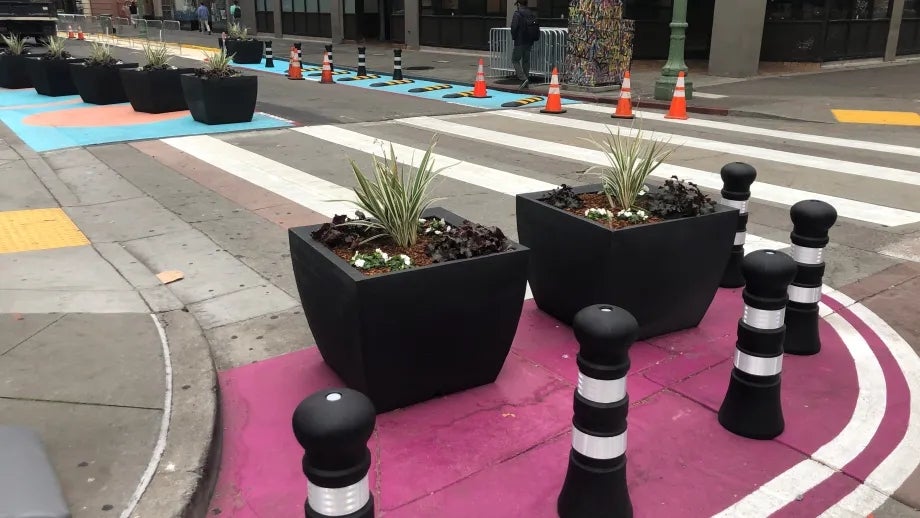Quick-Build for Complete Streets Webinar Series
Learn how to accelerate Complete Street redesigns in your city.
Visit the Technical Assistance portal for more resources related to quick-builds.
In this webinar series, learn how you can ramp-up Complete Street redesigns for your community, with pedestrian and bicycle facilities and protected intersections.
Webinars
Quick-Build Projects for Small Towns, Rural and Suburban Contexts
March 10, 2021 - Tony Garcia, Street Plans Collaborative
Over the past decade the Quick-Build method has been used by small towns, suburbs and rural areas to accelerate infrastructure improvements at an increasingly large scale.
Join MTC for a conversation with Tony Garcia from Street Plans Collaborative, one of the leading Quick-Build practitioners, to discuss how Quick-Build projects have been implemented in small towns, suburban and rural contexts in California and beyond.
Learn how projects have been implemented in collaboration with State agencies, and how the project types and applications change based on the surrounding land use context.
- “Quick-Build Projects for Small Towns” video recording
- “Quick-Build Projects for Small Towns” presentation
- ”Quick Build Projects for Small Towns” fact sheet
Hardening Slow Streets: From Pilot to Permanent during COVID-19
December 14, 2020 - Jessica Zdeb, Jeremy Chrzan, and Gwen Shaw, Toole Design Group
Join Jessica Zdeb, Jeremy Chrzan and Gwen Shaw from Toole Design Group to learn more about how to transition successful COVID-era street redesigns to pilot, interim, and permanent projects. We will discuss recommended processes, practices, designs, materials, and outreach strategies to ensure these transitions work for residents, the general public, and implementing agencies.
- ”Hardening Slow Streets” video recording
- “Hardening Slow Streets” presentation
- “Hardening Slow Streets” fact sheet
Adapting Streets During Uncertain Times: Using Quick-Build to Create Resilient Streets and Public Spaces
April 7, 2020 - Tony Garcia, Street Plans Collaborative
Cities around the world are recognizing the need to adapt to ever-changing conditions during the quarantine and beyond. Many are learning that this moment is presenting both a need and an opportunity to expand the space they allocate for bicyclists and pedestrians.
Join MTC for a webinar with Street Plans Collaborative Founder Tony Garcia for a conversation about how cities can use the Quick-Build methodology to address critical street safety and neighborhood improvement projects.
- ”Adapting Streets During Uncertain Times” video recording
- “Adapting Streets During Uncertain Times” presentation
- "Accelerating Quick-Build" fact sheet
Rebalancing Streets for People
April 8, 2020 - Gwen Shaw and Jeremy Chrzan, Toole Design Group
Discussion with Gwen Shaw and Jeremy Chrzan of Toole Design Group. Communities around the world are adapting to a new normal. One unanticipated dilemma is how to enable people to walk, bike, and run outside while still social distancing.
Popular parks and trails are filled with people exercising, getting some fresh air, and taking care of their mental health. Sidewalks and bike lanes are at capacity as essential workers walk, ride, and scoot instead of taking transit.
At the same time, many streets are eerily empty of cars. The pressure is on to re-balance our streets, at least temporarily, to provide more safe places for people to walk, bike, and run while maintaining a safe physical distance from each other. How do we make this transformation happen?
- “Rebalancing Streets for People” video recording
- “Rebalancing Streets for People” presentation
- "Accelerating Quick-Build" fact sheet
Quick-Build During a Crisis: Constructing Projects Rapidly for Social Distancing, Planning for Social Cohesion
April 9, 2020 - Vignesh Swaminathan, Crossroad Lab
Discussion with Vignesh Swaminathan of Crossroad Lab. Urban Vibrancy Matters. We see it now more than ever during a time of social distancing.
These unprecedented times affect us drastically. 2019 was the year of Urban Mobility and Active Transportation, but as 2020 comes around we are hit with the hard reality of COVID-19. But that does not mean we should lose momentum—if anything, the community is itching to get outside. Cities around the world have been collaborating to develop Quick-Build and Active Transportation projects.
Over the past few years, we’ve had the private sector, politicians, and communities all begging for rapid implementation. The need to quickly respond to community, traffic, paving, and equity issues—and now a shelter-in-place order—presents an opportunity to continue developing these types of projects.
- “Quick-Build During a Crisis” video recording
- “Quick-Build During a Crisis” presentation
- "Accelerating Quick-Build" fact sheet
Staff Contacts
Nicola Szibbo, MTC Principal Engineer
Phone: 415-778-6720
Email: nszibbo@bayareametro.gov
Toshi Shepard-Ohta, MTC Assistant Director
Phone: 415-778-5280
Email: tshepard-ohta@bayareametro.gov

